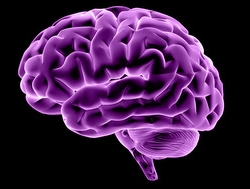
Has a summer cold or mold allergy stuffed up your nose and dampened your sense of smell? We take it for granted that once our nostrils clear, our sniffers will dependably rebound and alert us to a lurking neighborhood skunk or a caramel corn shop ahead.
That dependability is no accident. It turns out the brain is working overtime behind the scenes to make sure the sense of smell is just as sharp after the nose recovers.
A new Northwestern Medicine study shows that after the human nose is experimentally blocked for one week, brain activity rapidly changes in olfactory brain regions. This change suggests the brain is compensating for the interruption of this vital sense. The brain activity returns to a normal pattern shortly after free breathing has been restored.
Previous research in animals has suggested that the olfactory system is resistant to perceptual changes following odor deprivation. This new paper focuses on humans to show how that’s possible. The study is published in the journal Nature Neuroscience.
“You need ongoing sensory input in order for your brain to update smell information,” said Keng Nei Wu, the lead author of the paper and a graduate student in neuroscience at Northwestern University Feinberg School of Medicine. “When your nostrils are blocked up, your brain tries to adjust to the lack of information so the system doesn’t break down. The brain compensates for the lack of information so when you get your sense of smell back, it will be in good working order.”
For the study, Wu completely blocked the nostrils of 14 participants for a week while they lived in a special low-odor hospital room. At night, participants were allowed to breathe normally while they slept in the room.
After the smell deprivation, researchers found an increase in activity in the orbital frontal cortex and a decrease of activity in the piriform cortex, two regions related to the sense of smell.
“These changes in the brain are instrumental in maintaining the way we smell things even after seven days of no smell,” Wu said.When unrestricted breathing was restored, people were immediately able to perceive odors. A week after the deprivation experience, the brain’s response to odors had returned to pre-experimental levels, indicating that deprivation-caused changes are rapidly reversed.
Such a rapid reversal is quite different from other sensory systems, such as sight, which typically have longer-lasting effects due to deprivation. The olfactory system is more agile, Wu suggested, because smell deprivation due to viral infection or allergies is common.
This study also has clinical significance relating to upper respiratory infection and sinusitis, especially when such problems become chronic, at which point ongoing deprivation could cause more profound and lasting changes, Wu noted.
“It also implies that deprivation has a significant impact on the brain, rather than on the nose itself,” Wu said. “More knowledge about how the system reacts to short-term deprivation may provide new insights into how to deal with this problem in a chronic context.”
Other Northwestern authors include Bruce K. Tan, MD, James D. Howard, David B. Conley, MD, and Jay A. Gottfried, MD, PhD, the senior author.
The research was supported by grants R01DC010014 and K08DC007653 from the National Institute on Deafness and Other Communication Disorders of the National Institutes of Health and grant M01-RR00048 from the National Center for Research Resources of the National Institutes of Health.






